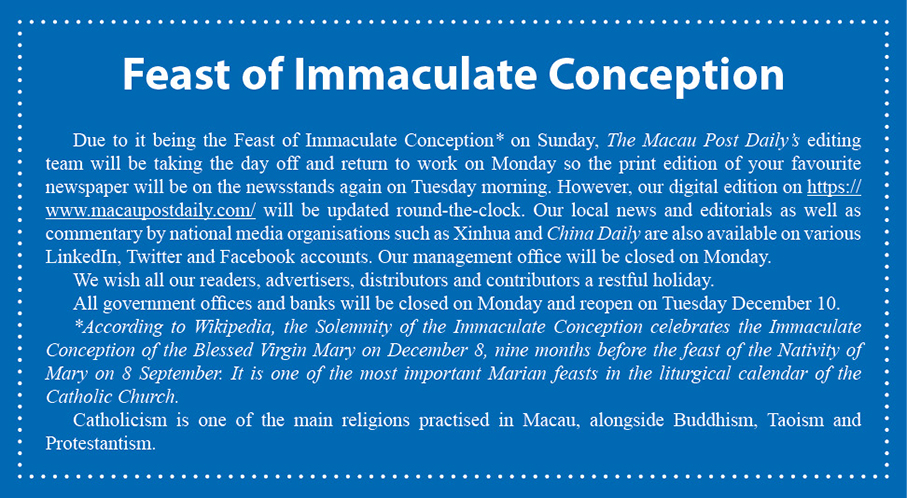Do we have to learn to live with COVID-19?
Commentary by Lee Tak Lim
Many countries are preparing to welcome visitors, at least from COVID-19 low risk countries. Vaccinated Macau citizens should be able to pack and go after being trapped for more than a year and a half. But the question is: “Do we have to be quarantined when we get back?”
The government is very reluctant to take any risk, except for the mainland on which Macau’s economy depends the most. With hundreds of thousands crossing the Macau-Zhuhai border every day, how long can our unbroken record last? This is a trade-off that we should not complain about.
The government’s prudent COVID-19-19 policy is evident from its handling of our neighbour Hong Kong on border opening talks. Our cautiousness is not without reason. Concerning the handling of COVID-19, we can conclude that Hong Kong has been responsive, while Macau has been pre-emptive. One good example is the recruitment of hotels to quarantine citizens and visitors.
When the government envisaged the potential risk of a COVID-19 outbreak caused by returning citizens, it contracted hotels to accommodate them until their prescribed quarantine period ended. It took Hong Kong more than a year to do the same. Its recent mini-outbreak might be due to its rather loose home quarantine arrangements.
The only excuse that Hong Kong has to defend its policies is its diversity and complexity. Hong Kong has, now, turned the corner. It is copying the mainland’s model by encircling buildings and districts where COVID-19 infectees are suspected to live for compulsory nucleic acid tests (NAT).
The governments of Macau and Hong Kong haven’t been shy of disclosing their talks of lifting the current travel restrictions. I am optimistic that the mainland, Macau and Hong Kong will soon agree on how their citizens can travel between them and without the need to be quarantined. But the tricky part is how the established travel arrangements will be handled during a mini-outbreak
The most recent mini-outbreak in Guangdong is a reference. Instead of an immediate lockdown, Macau just tightened its nucleic acid test requirements for those coming from the province from seven to two days. Would this flexibility be also applied to the arrangement between Macau and Hong Kong?
Compared with countries whose citizens are subject to travel restrictions, we are lucky. Subject only to a nucleic acid test, Macau citizens can travel to the mainland and vice versa for mainlanders. Hong Kong will soon join the party. How long do we have to wait to return to the kind of life before COVID-19 – to travel where ever we want to go?
Countries with a higher vaccination rate than Macau’s like the UK, US and some continental European countries are preparing to welcome visitors again. Why does a higher vaccination rate matter?
The protection from inoculation is not perfect. But when a country’s vaccination rate achieves herd immunity level, the contagious COVID-19 spreads much more slowly. Hospitals would not be overwhelmed by COVID-19 patients. The medical condition of the vaccinated, if, unfortunately, infected, is said to be much less severe and seldom fatal.
Scientists predict that COVID-19 will stay with us, just like the flu. Life has to get back to normal and the herd immunity injection rate is crucial. It is very likely, at least in the next few years, that countries will only welcome vaccinated visitors. In other words, vaccination is a global passport.
Macau’s vaccination rate is far from reaching herd immunity level. Other than the mainland and Hong Kong, the local government will not be comfortable opening its arms to visitors even if they come from countries that have achieved herd immunity. It is because they still have many COVID-19 cases.
Before Macau achieves its herd immunity injection rate, we are restricted to where we can go. It is not because we are not welcome but because we would be quarantined when we get back. What can the government do to boost the injection rate?
The government should seize the opportunity of the present mainland-Macau-Hong Kong talks of border opening arrangements. It needs to create incentives for people to get their two jabs, such as by a) making vaccination a condition of entry in addition to a nucleic acid test; or b) making vaccination eligible for a less frequent nucleic acid test requirement.
After Macau achieves its herd immunity level, it needs to accept the idea that we have to live with COVID-19. We have to prepare for this when visitors other than just from the mainland and Hong Kong come again. It is just a matter of time before we have to open up.
Eventually the government has to waive its current quarantine requirement even for vaccinated local returnees and tourists. I am afraid it is this that the government might find troubling.









